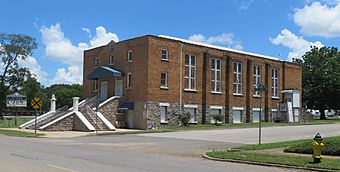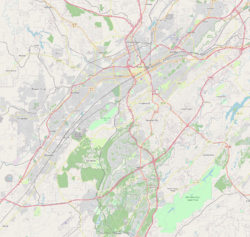St. Luke AME Church facts for kids
Quick facts for kids |
|
|
St. Luke AME Church
|
|
 |
|
| Location | 2803 21st Ave. N, Birmingham, Alabama |
|---|---|
| Area | 2 acres (0.81 ha) |
| Built | 1926 |
| Architect | Wallace Rayfield |
| Architectural style | Gothic Revival |
| MPS | Civil Rights Movement in Birmingham, Alabama MPS |
| NRHP reference No. | 05000296 |
| Added to NRHP | April 22, 2005 |
The St. Luke AME Church is a very important building located at 2803 21st Avenue North in Birmingham, Alabama. It is a historic African Methodist Episcopal church. This type of church is part of a Christian faith that was started by African Americans.
The church was built in 1926. It was designed by a very talented African American architect named Wallace Rayfield. St. Luke AME Church is also famous for its role in the civil rights movement. This was a time when people worked hard to gain equal rights for all Americans, especially African Americans.
Contents
A Special Place in History
St. Luke AME Church played a big part in the civil rights movement in Birmingham. Churches like St. Luke often served as meeting places. People gathered there to plan peaceful protests and discuss ways to achieve fairness and equality. These churches were safe spaces for the community. They helped people come together and work for important changes.
Designed by a Visionary Architect
The church building itself is special because of its design. It was created by Wallace Rayfield, a pioneering African American architect. He was one of the first African American architects to become widely recognized for his work. Rayfield designed many churches and other buildings, especially for African American communities. His work helped shape the look of many neighborhoods.
Honored as Historic
Because of its important history and beautiful design, St. Luke AME Church was added to the National Register of Historic Places on April 22, 2005. The National Register is a list of places in the United States that are important to American history. Being on this list helps protect the church and recognize its value for future generations.
See also
- St. Luke AME Zion Church – another important church in Birmingham that also played a role in the civil rights movement. It was also added to the National Register of Historic Places in 2005.
References
 | William Lucy |
 | Charles Hayes |
 | Cleveland Robinson |




